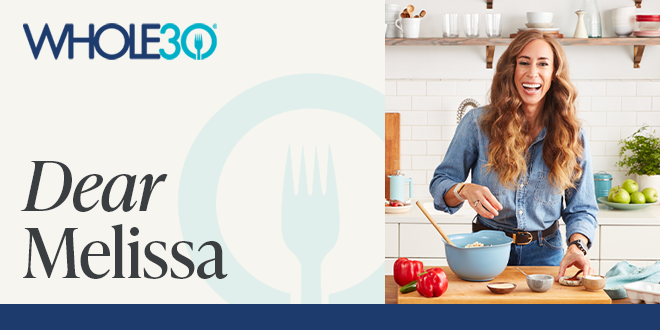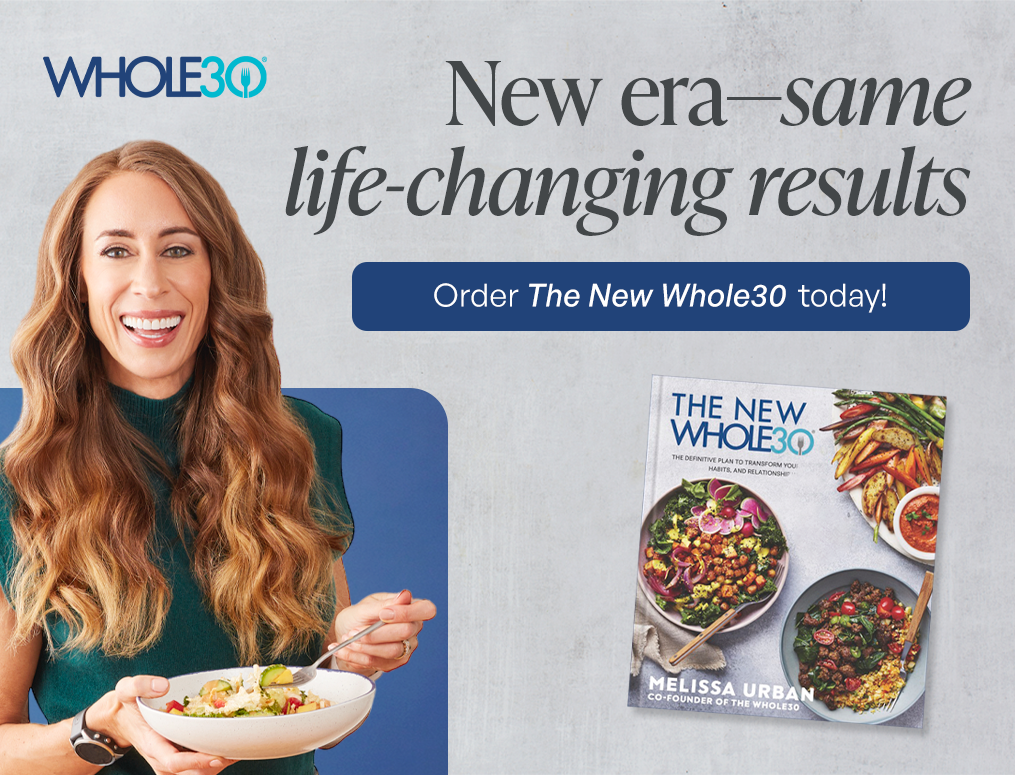Dear Melissa,
You’ve talked about how the voice, tone, and language in The New Whole30 has evolved over the years. I appreciate that you’ve evolved, but I found the tough love, “this is not hard” Melissa from older versions of the Whole30 so motivating! I needed that tough love to succeed with the program. Will The New Whole30 now be too gentle for me? —Tough Love Lover
Dear Tough Love Lover,
You’re not the only person to send me this kind of message. In fact, many of them were even more direct (ahem). “The Whole30 has gone soft,” one person wrote definitively. “The program used to be hard—we felt proud when we did it. Now it’s all ‘let good enough be good enough,’” another wrote.
First, I appreciate and understand why so many of you connected with the “tough love,” “no cheats, slips, or excuses” language in my earlier books. I connected with that too! It was the way I motivated myself, so naturally that came out in my writing. Older versions of the program (2010) were even more “no B.S.” On my old CrossFit training blog, I wrote, “Stick to the rules 100% or go somewhere else—I don’t have time to help people who aren’t committed.” (Ouch.)
Still, the program and that language proved wildly successful, right? Millions of people just like you did the program with that language (maybe even thanks to that language), and succeeded. Except… the program was only successful for the people that language connected with. People like you, who relished the tough love, and took those words as motivation, empowerment, or a healthy challenge.
There were (potentially) millions of other people for whom that language was a huge turn-off. “That tough love approach made me believe the Whole30 wasn’t for me,” one woman told me. “That language made me feel shamed and judged,” another commented on a recent post. I’ll never know how many people reviewed the program, said, “Oof—no thanks,” and moved on. I’ll never know how many never came back as a result.
Language authentic to me—today
Here’s the thing—if that tough love approach was still in my integrity, still authentic to the person I am today, I’d keep it. I’d still be writing like that today, and I’d willingly accept that some people—maybe many people—wouldn’t do the Whole30 because of it.
But it’s not in my integrity, and it’s not authentic to the person I am today. It hasn’t been for quite some time, as I’ve grown, evolved, and done a lot of therapy. I had to change the language we used, because I no longer felt good about the way I used to say it. I don’t talk to myself like that anymore, so I won’t talk to you like that either. (Unless it’s a one-on-one conversation and you’re asking for some tough love. I still have it in me.)
Does that mean I’m willing to accept that some of you might leave as a result, believing the Whole30 is “too soft” now? Yes, I am. But before you go, hear me out.
Keep what you like, let others do the same
That tough love language is always available to you. Earlier versions of the book still feature it. You can always pull it out of your memory. You get to keep it forever. So if you still find that motivating, empowering, and challenging in a healthy way—good! Stick with it! Use it to motivate, empower, and challenge yourself along your Whole30 journey. I would never want to take that away from you.
But please, make room for me to evolve. Make room for the Whole30 to evolve. Make space for those who thought the program wasn’t for them to come back and try it again. Be happy that a broader range of people will now feel welcomed and included. Be excited that even more people will experience the same life-changing transformation you did.
Mark my words, the Whole30 will always be hard. Giving up the foods you love for 30 straight days is hard. Missing your favorite comfort foods during stressful moments is hard. Reestablishing trust in yourself and your body is hard. And for some, drinking your coffee black (or not stepping on the scale, or passing on the wine) will be hard too. Those coming into the program will be challenged regularly—physically, mentally, and emotionally. Anyone who completes it should feel a sense of pride.
If you feel as though people who lean hard into self-grace and self-compassion during their program somehow accomplish less—I’ll see you out the door myself. But I don’t think you’d believe that. You know what a Whole30 entails. And I’m betting you’d high-five anyone who successfully completes the program, no matter how they chose to support themselves (and be supported) through it.
I won’t presume to tell you how your self-talk and motivation should evolve over time. You know best what is in your highest interest. What I will say is that I’m thrilled to welcome a whole new crop of Whole30ers into our community, thanks to the kinder, more compassionate language you’ll find in The New Whole30. And I really hope you stay, because they’re gonna need confident, experienced veterans like you to guide, lead, and support them through it.
That may feel hard—but I know you are up for the challenge.
XO, Melissa
















